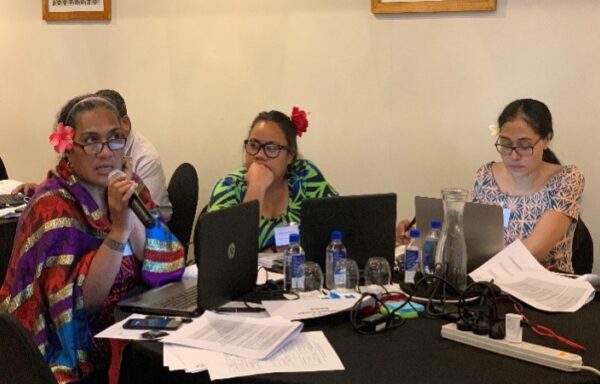StaTact impact stories - Improving data quality in National Statistical Offices
Oct 28, 2021
Location

Ms. Aliimuamua Malaefono
Chief Statistician – Samoa Bureau of Statistics
Improving data quality in National Statistical Offices
Samoa Bureau of Statistics, 2019. We were fortunate enough to talk to Ms. Malaefono, the Samoan Chief Statistician. Ms. Malaefono joined the Samoa Bureau of Statistics in 1999 as the Manager of the Census and Survey Operations Unit. She has worked for the Bureau for 19 years and finally became the Government/Chief Statistician in January 2018 overseeing eight technical units.
The office has grown from about 40 employees to 90 employees, all with diverse technical expertise. Having worked at the Bureau for a long time, she was aware of the data gaps within the national statistical system. The data usually included missing indicators or was of poor statistical quality, the main reasons for which were limited technical expertise within the various divisions and Ministries and the lack of alignment between the data needs of the statistics office and policymakers. Hence, when she was approached by UNITAR to take part in workshops to address these gaps, she quickly came on board. Ms. Malaefono took part in both training workshops offered by UNITAR in Fiji. The focus of these courses was to address the data needs’ gaps and strengthen the statistical capacity of statistical offices.
Ms. Malaefono was very enthusiastic about the contribution the training course had on her skills development. She described how she learned about the short-term approaches to data planning, how to extend short-term planning into a strategic framework, and about multi-stakeholder engagement for addressing data challenges (incl. data producer-data user), the importance of disaggregated data for SDG decision-making and action planning. Ms. Malaefono also shared Samoa’s experience developing home-grown indicator frameworks to follow up progress on the SDGs.
When she returned to Samoa, Ms. Malaefono quickly applied the skills she had learned. She contributed to the development of an action plan to tackle the use of unreliable administrative data from various agencies. She shared skills on how to improve their offices’ existing SDG data framework and organised a meeting between statisticians and policymakers to share the skills she had acquired during the course. During these meetings, she also encouraged everyone to work together, thereby improving the use of statistics and trust between the two entities. She later presented the upgraded SDG data framework that she had worked on with her team. She also strengthened the collaboration between her office and other Ministries. All this was possible thanks to the support she received from her colleagues and the existence of systems and processes at the Bureau where she could use her newly acquired skills.
The application of these skills has improved the functioning of the Samoan statistical office. Ms. Malaefono indicated that 25 per cent of the application could be attributed to the training courses she attended. They are now able to plan for surveys, ensuring that there is enough staff and sufficient budget to produce high-quality data. The importance of using international methodologies and following statistical guidelines is now better understood by colleagues from different departments and Ministries, which enables the use of administrative data when data collection in the field is not feasible.
Ms. Malaefono also acquired new skills in her capacity as Government Statistician. She learned how to analyse data using StaTact, an application which was used during one of the workshops she attended. As a result of the training programme, her confidence levels have improved. She can now confidently stand in front of parliament or cabinet and relay the findings from her office as she is assured of the reliability and quality of the data collected using international methodologies. Policymakers are now aware of the importance of the work the Bureau does and are more open to discussing their data needs and funding requirements.
*The Impact story has been prepared and published by UNITAR and can be accessed here.
